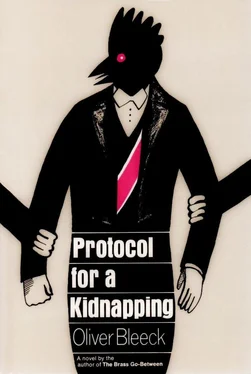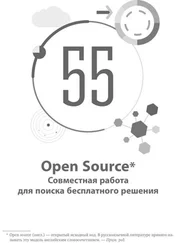“That doesn’t seem to be much of a secret,” I said. “The only ones who didn’t seem to know about it were you and Pernik.”
“I didn’t quite tell you the truth in New York, Mr. St. Ives,” Stepinac said. “One of the principal reasons that I spent so much time interviewing Pernik is because we were curious why the American ambassador should take such an interest in him.”
“And you learned that he was interested in the granddaughter instead.”
Stepinac stopped and looked up and down the alley as if to make sure that no one was around. He needn’t have bothered. It was still deserted. “I also learned,” he said, “that there is no one — no one in the entire world — who’d risk kidnapping a United States ambassador just to secure the release of that old man from house arrest.”
“Maybe that wasn’t their motive,” I said.
“That’s right. It wasn’t their motive. It wasn’t the poet that the kidnappers wanted, it was the granddaughter.”
“There’s another possibility,” I said.
“What?”
“They may have wanted to use Pernik as a hostage, to make sure that the million dollars was paid.” I’d just used the same theory on Bartak. I decided to see how it worked with Stepinac. It didn’t go over.
“I might have accepted that theory yesterday, or even the day before,” Stepinac said.
“But not now?”
“No.”
“Why?”
“Because of your own peculiar actions, Mr. St. Ives. You have been under surveillance, you know.”
“Yes.”
“I think you are getting yourself into something which could prove most dangerous — and which really has nothing to do with either Pernik or his granddaughter.”
“I’m not sure that I follow you.”
“I thought that might be your reaction,” Stepinac said. “That’s why I decided to convince you.”
“How?”
“I’ll call it a direct confrontation,” he said.
“With whom?”
We were at the end of the alleylike street. Stepinac stopped and looked at his watch. “We’ll make our confrontation in exactly five minutes,” he said.
“Where?”
He nodded across the street. “There.” It was a small house, a cottage really, with mullioned windows that occupied a narrow lot between two buildings which looked like some more warehouses. It was an anachronism snuggled in between two symbols of industrial progress and because of it, I had been able to catch my glimpse of the Danube. The cottage was snow-covered now and its lot seemed to run right down to the river’s edge. At its rear I could see a small greenhouse and at the right of its front door was a fan-shaped trellis that might have borne climbing roses in the spring but was as bare now as the three large chestnut trees which grew in its small yard. A single light showed in one of the cottage’s windows.
“Who lives there?” I said.
Stepinac looked at his watch again. “You’ll know in five minutes.”
We waited in the entrance of the alley, not talking, and when the five minutes were nearly up, Stepinac started across the street. I followed just as the lights of a car parked at the curb switched on. The car sped away from the curb quickly and I hesitated. Stepinac was already in the middle of the street. The whine of the engine shifted into a roar and Stepinac looked to his left. It may have been because he was tired, but he didn’t move as fast as he had in New York, not nearly as fast, and the gray Mercedes smashed into him with its bumper and grill and slammed him flat on the pavement. It may have made a sound, but I couldn’t hear it over the noise of the engine. The Mercedes didn’t stop.
He wasn’t dead when I got to him. His eyes were open, but I’m not sure that they saw anything. He muttered something, but I couldn’t understand what it was. I put my ear close to his mouth and he seemed to mutter again and it sounded something like, “It was no accident this time,” but perhaps that’s only what I expected him to say. I’m still not sure. He had no other dying words, no revelations, no confession. Some blood came out of his mouth and ran down his chin. His mouth widened and for a moment I thought he was trying to smile, but he wasn’t. He was dying instead and the stretched mouth was only a dead man’s rictus.
I rose and crossed the street and knocked on the door of the cottage for a long time, but no one answered. I went back to the street and waited for a car to come by so that I could hail it, but none came. So I left him there in the street like that and walked up the alley and all the way back to the Metropol hotel.
I waited until the debate about who sat where ended before I said anything and then I said, “You want to clear your throats? Maybe cough a few times?”
Wisdom looked at me from his seat by the window. “What’s your trouble?” He turned toward Knight who was again sprawled on my bed. “Our leader seems to be under a strain. Have you noticed the tight lips, the nervous gestures?”
“He’s probably decided to double-cross someone,” Knight said. “He only wants us to reassure him that it’s all in a good cause.”
“The first plane out of here is at ten fifteen this evening,” I said. “You’d both better catch it. The deal’s gone sour.”
Knight sat up and swung his feet to the floor. “God, St. Ives, when you get noble, you’re really awful.”
“I liked him better when he was a shit like us,” Wisdom said. “I don’t care much for him when he’s Carstairs.”
“Carstairs?” Knight said.
“Carstairs the magnificent. You know Carstairs. When they come to the edge of the desert he’s the one who always turns to his two buddies and says, ‘If you don’t hear from me in three weeks, tell Mary...’ Then he breaks off and goddamned near blushes and says, ‘But you know what to tell her,’ and then one of his buddies, the stupid one, like you, Knight, says, ‘But that’s fifteen hundred miles of burning sand, Carstairs,’ and Carstairs, the prick, shades his eyes with his hand and says, ‘Isn’t that what all of life is?’”
Knight nodded several times. “Now I remember Carstairs. St. Ives does resemble him. The eyes especially.”
“Shifty,” Wisdom said.
“And the chin.”
“Weak.”
“And the mouth.”
“Slack-lipped,” Wisdom said.
“Why don’t you tell us a little about it, Carstairs,” Knight said, “and then we’ll make up our own minds about what we’ll do. Maybe we don’t want to go back to New York via Frankfurt which is a lousy town anyway. Maybe we’ll go to Venice.”
“Or London,” Wisdom said. “I know some girls in London. They’d be fascinated with my adventures in Belgrade — all about how I saw one real mosque and rented a car and got drunk once and then took a tour of the old Kalemegdan fort which is just a hell of a sight. I could tell them that I always have such madcap experiences when I go traveling with my old buddy Carstairs.”
“All right,” I said. “I’ll tell you about it.”
“Just don’t go noble on us,” Knight said.
“I only get those attacks once or twice a year,” I said, and then told them about it — about Stepinac and who he said he was and how he got killed, about Jovan Tavro who needed to get out of the country, and about Anton Pernik who didn’t because he was dead. When I was through they both thought about it for a few moments and then Knight was the first to ask a question.
“Who do you think killed the guy who looked like you?”
“I don’t know,” I said. “He was supposed to take me to see somebody or meet somebody, but we never made it.”
“Any idea of who it was?” Wisdom said.
I shook my head. “None.”
Читать дальше












